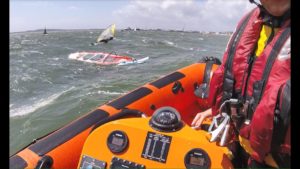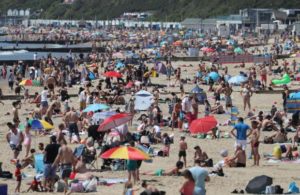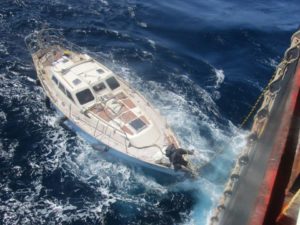Time to reduce demand placed on emergency services after ‘tough’ weekend?

There’s a call from HM Coastguard for parents to take charge and be ‘beach smart’ if they visit the coast to ensure they and their families have the safest summer possible, whether lifeguards are patrolling their beach or not.
“We know from sad experience that whether you’re local or not, whatever your ability of experience in your chosen sport or leisure activity, the sea can still catch you out and be unmerciful when it does,” says Claire Hughes, director of HM Coastguard. “Now, more than ever we need people to respect the sea and the coast.”
This comes after a weekend which police called ‘tough’.
Two deaths were among multiple incidents reported to emergency services over this bank holiday (23/24/25 May).
In one incident a man is in a serious condition in hospital after being found face down in the water at Porthtowan.
Steve England, from surf magazine Carve, who was surfing, said he and others gave the man CPR and pulled him out of the water while waiting for the coastguard helicopter and a lifeboat to arrive.
“If we had a lifeguard on the beach we would have got oxygen to the casualty within two minutes but we had to wait 20 minutes,” he told the BBC.
A tweet from Carve states: “Just recovered and gave in water CPR to unconscious surfer. No RNLI lifeguard back-up, no oxygen. Lots of ex-lifeguards to help but no equipment to save lives. CEO and bosses should resign. It is D-Day right around the coast. Lifeboat crews are disgusted with lack of leadership.”
“We continue to do what we can to get a lifeguard service up and running as soon as possible,” an RNLI statement says. “But it must be safe for our lifeguards and the public when the risk posed by coronavirus is still a very real threat.”
Despite the ongoing challenges posed by coronavirus, the RNLI still hopes to provide a lifeguard service on around 30% of the beaches the charity usually covers in time for the traditional peak summer season. But at present, there are no RNLI lifeguards on UK beaches. The roll-out of a reduced service is expected to take place ‘in phases’ from the end of the month, to patrol 70 (instead of 240) beaches.

Windsurfer in difficulty at Poole. Credit RNLI
Last weekend (16/17 May), coastguard rescue teams were called out 194 times in the UK to incidents including inflatables drifting offshore, crashed jet skis, people injured while out walking or cycling along the coast, paddleboarders, kayakers, windsurfers and kite surfers in difficulty, and people cut off by the tide.
“If the charity’s lifeguards were present on the beaches, they would be preventing many incidents before they even occurred by directing people to safe swimming areas, highlighting dangers such as rip currents and advising people not to use inflatables. These preventive measures are not currently in place, meaning people could find themselves in danger if they are not reading the signs and following the relevant safety advice,” says Gareth Morrison, RNLI Head of Water Safety.
“Our lifeguards are trained to swim 200m within 3 1/2 minutes, and although our volunteer lifeboat crews are fully operational, should they be needed, they won’t be able to reach you in the same time.
“It is important that anyone visiting the coast understands that the beach can be a dangerous environment, and you must take more responsibility for you and your family this summer. No one ever goes to the coast to be rescued, yet RNLI lifeguards rescue 1,000s each year.”
Other incidents over the weekend included a number of surfers struggling in a rip current and two kayakers in difficulty.
A teenage girl trapped beneath a capsized boat and a man who was pulled out of the sea off the Cornwall coast both died, police say.
The girl was with three others who survived after their rigid inflatable boat capsized on the Doom Bar near Padstow, according to the BBC. The girl died after being airlifted to hospital and the man who had been struggling in the water at Treyarnon Bay at about 12:30 BST was pronounced dead at the scene.
Police say it was “a very tough day for local emergency services”.
A lady was rescued from the water at Fleetwood after being caught out by the incoming tide.
“The casualty got into difficulty while litter picking on the beach but had not checked the tide times and wrongly assumed the tide was going out, when it was in fact coming in,” says a spokesperson at Holyhead Coastguard Operations Centre. “This resulted in her getting cut off on a sand bank with water all around her, when she tried to wade ashore she got stuck in the sand.
“It must have been a frightening experience for her and on initially making the 999 call to the Coastguard the water was up to her knees but within ten minutes it was up past her waist.”

Bournemouth Beach
Bournemouth, Christchurch and Poole Council posted on twitter:
“!Our seafront car parks are full! Please #ThinkTwice before visiting the beach – there are other less busy but equally lovely open spaces to enjoy or please #stayhome. If you do go out, please avoid parking in local roads or breaching traffic regulations and risking a fine.”











